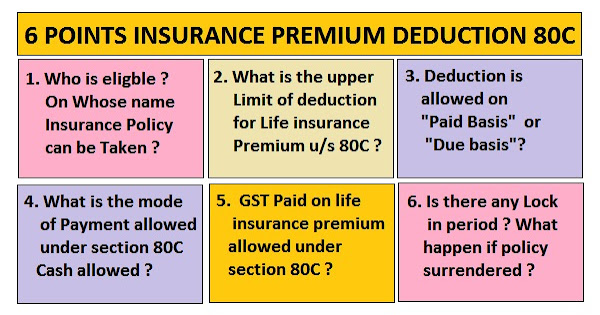Are you considering purchasing a life insurance policy and wondering if the premiums are tax-deductible? The short answer is: it depends. While life insurance premiums are generally not tax-deductible for individuals, there are some exceptions that allow for deductions in specific situations. In this comprehensive guide, we’ll explore the intricacies of tax deductions for life insurance premiums and provide you with the knowledge to make informed decisions.
The General Rule: Life Insurance Premiums are Not Tax-Deductible
The Internal Revenue Service (IRS) treats life insurance premiums as personal expenses, similar to clothing or groceries. As a result, most individuals cannot deduct their life insurance premiums from their taxable income. This rule applies to various types of life insurance policies, including term life, whole life, and universal life insurance.
Exceptions: When Life Insurance Premiums Are Tax-Deductible
While the general rule states that life insurance premiums are not tax-deductible, there are a few notable exceptions where deductions may be allowed. Let’s explore these scenarios:
1. Employer-Sponsored Group Term Life Insurance
If you receive group term life insurance coverage through your employer, the premiums paid by your employer for coverage up to $50,000 are generally not taxable to you. However, if the coverage exceeds $50,000, the cost of the premiums for the excess amount must be included in your taxable income. In this case, your employer can deduct the entire premium amount as a business expense.
2. Key Person Life Insurance
Businesses often take out life insurance policies on key employees, such as executives or individuals with specialized knowledge or skills. If the business is the beneficiary and the policy is intended to protect the company’s interests, the premiums paid can be deducted as a business expense.
3. Charitable Donations of Life Insurance Policies
If you donate a life insurance policy to a qualified charitable organization and name the charity as the beneficiary, the premiums you pay after the donation may be tax-deductible as a charitable contribution. However, the deductible amount is subject to certain limitations and calculations based on the policy’s cash value and the insured’s age.
4. Alimony and Life Insurance Premiums
In certain alimony agreements established before 2019, the premiums paid for life insurance policies intended to secure alimony payments may be tax-deductible for the payer. However, due to changes in the tax law, this deduction is no longer available for alimony agreements established after December 31, 2018.
Taxation of Life Insurance Payouts and Cash Value
While life insurance premiums are generally not tax-deductible, it’s important to understand the tax implications of life insurance payouts and the cash value component of permanent life insurance policies.
Life Insurance Payouts
In most cases, life insurance payouts (also known as death benefits) received by beneficiaries are not subject to income tax. This tax-free treatment applies regardless of the size of the payout. However, it’s crucial to note that life insurance proceeds may be subject to estate taxes if the deceased’s total estate exceeds the federal estate tax exemption limit, which is currently $12.92 million for individuals and $25.84 million for married couples in 2023.
Cash Value of Permanent Life Insurance
Permanent life insurance policies, such as whole life and universal life, have a cash value component that grows tax-deferred over time. This means that the cash value accumulates without being taxed annually. However, when you withdraw or borrow against the cash value, the portion representing investment gains is generally taxable as ordinary income.
It’s essential to consult with a qualified tax professional or financial advisor to ensure you understand the specific tax implications based on your unique circumstances.
Maximizing Your Tax Savings with Life Insurance
While tax deductions for life insurance premiums may be limited, there are strategies you can employ to maximize your tax savings:
-
Consider a Section 162 Bonus Plan: If you own a business, you may be able to deduct the premiums paid for life insurance policies on key employees through a Section 162 Bonus Plan. This plan allows the business to deduct the premiums while the employees pay taxes on the economic value of the insurance coverage.
-
Explore Charitable Giving Strategies: Donating a life insurance policy to a qualified charity can provide tax benefits by allowing you to deduct the premiums paid after the donation as charitable contributions.
-
Review Your Estate Plan: If you have a substantial estate, proper estate planning can help minimize potential estate taxes on your life insurance proceeds. Strategies like an Irrevocable Life Insurance Trust (ILIT) can remove the life insurance proceeds from your taxable estate.
-
Consult a Professional: The tax implications of life insurance can be complex, and it’s always advisable to seek guidance from a qualified tax professional or financial advisor who can assess your specific situation and provide tailored advice.
Conclusion
While life insurance premiums are generally not tax-deductible for individuals, there are exceptions and strategies that may allow for deductions in certain circumstances. By understanding the rules and working with professionals, you can make informed decisions and potentially maximize your tax savings when it comes to life insurance premiums.
Remember, the tax landscape is constantly evolving, and it’s crucial to stay up-to-date with the latest regulations and changes. By being proactive and seeking professional advice, you can ensure that your life insurance planning aligns with your overall financial goals and tax strategies.
Are Life Insurance Premiums Tax Deductible
FAQ
Can you write off life insurance premiums on taxes?
Which insurance premiums are tax-deductible?
Are personal life insurance premiums usually deductible for federal income tax purposes?
Are premiums on life insurance taxable?

